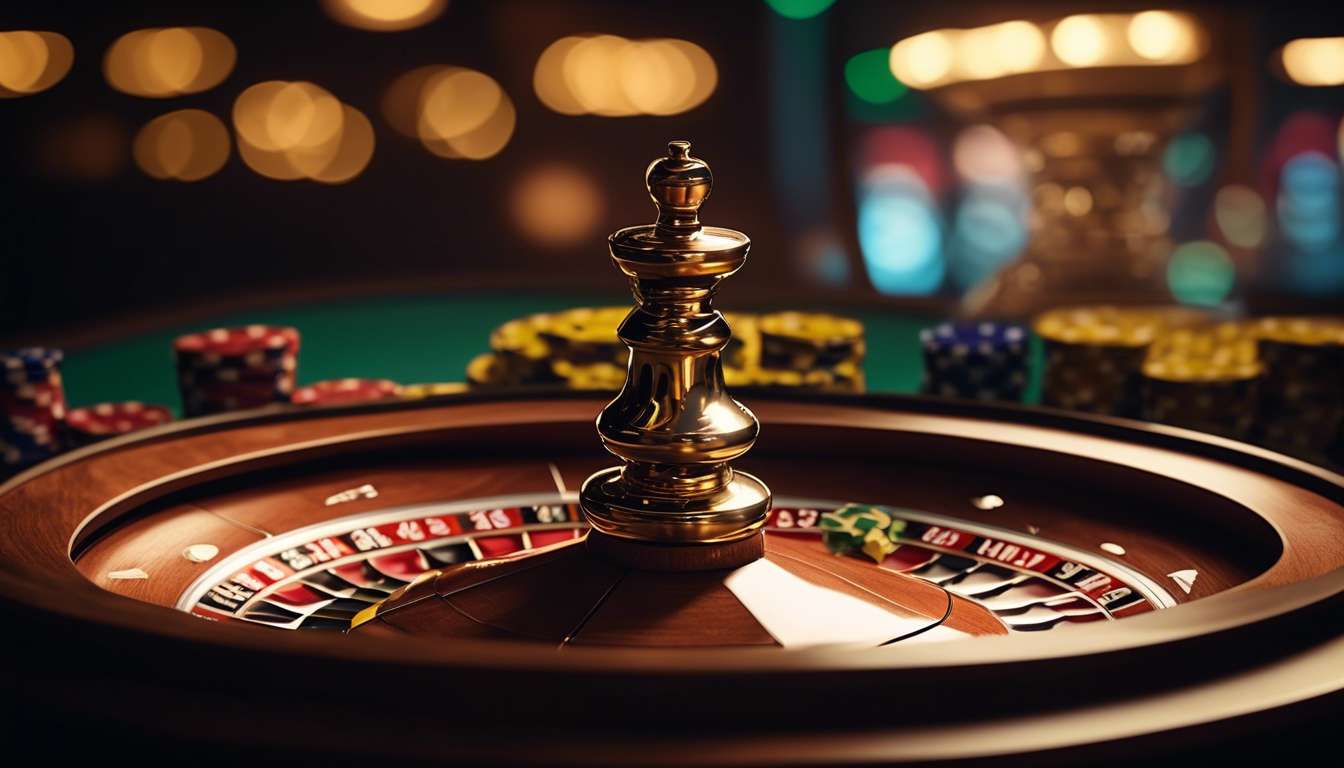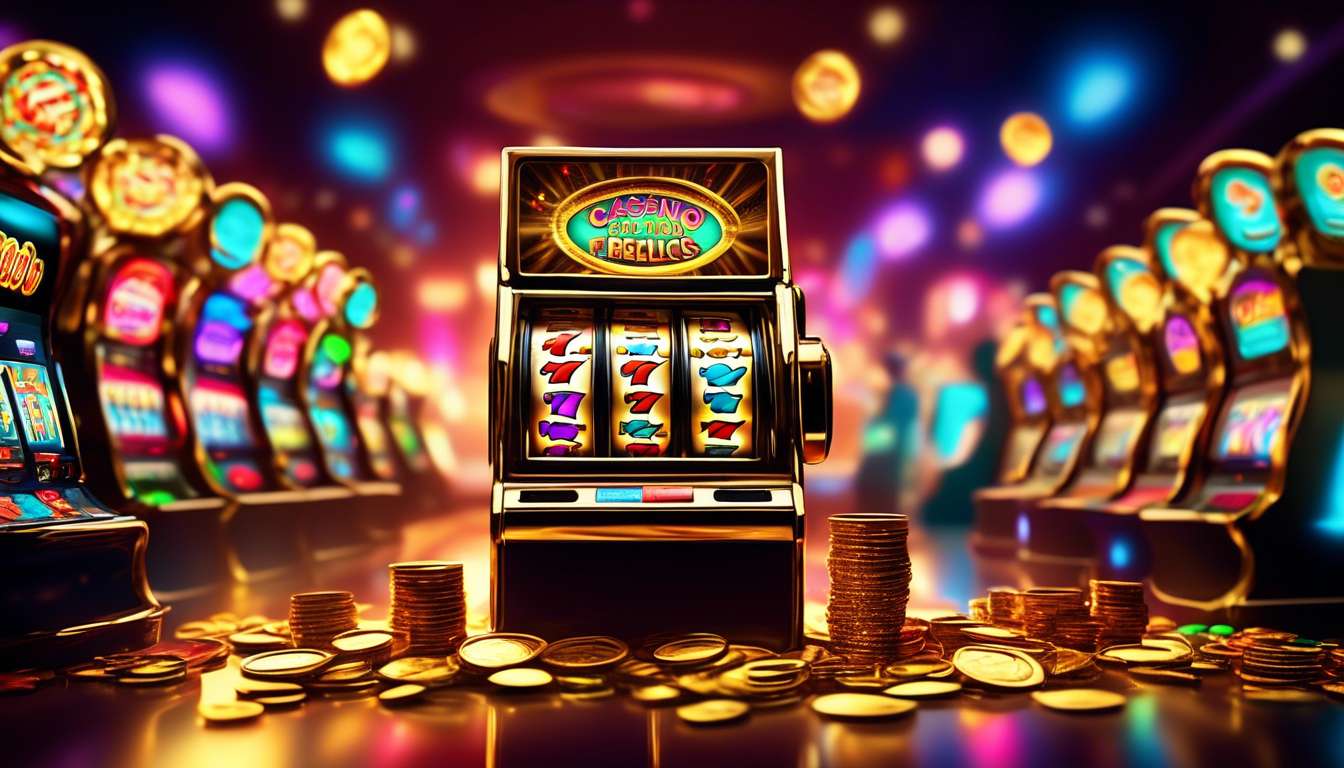When we step into the vibrant world of casinos, the allure of flashing lights and the promise of fortune capture our imaginations. Yet, beneath the surface of each game lies a crucial concept that we must understand to make informed decisions: the house edge.
Understanding the House Edge
As avid players or curious newcomers, we often hear the term, but what does it truly mean for us? By exploring the intricate details of the house edge, we can demystify the odds and gain insight into how casinos maintain their advantage.
Empowerment Through Knowledge
This knowledge empowers us to navigate the gaming floor with confidence, enabling us to choose games that align with our strategies and preferences.
Exploring Casino Games
Together, we will delve into the mechanics of popular casino games, breaking down the math behind them and providing practical tips to help us enjoy our casino experiences while maximizing our chances.
Let’s embark on this journey to uncover the hidden truths of the casino world.
The Significance of House Edge
The House Edge is crucial because it determines the casino’s long-term advantage over players. By understanding this concept, we can feel more connected and informed within the gaming community.
The house edge represents the percentage of each bet that the casino expects to keep over the long haul. It’s important to note that while casinos have this advantage, it doesn’t mean we’re doomed to lose every time. Instead, knowing the house edge allows us to make smarter choices and adjust our strategies accordingly.
Return to Player (RTP) focuses on the percentage of wagered money that is expected to be returned to players over time. A higher RTP means that the game is more favorable to us, reducing the house edge.
To enhance our gaming experience, consider these strategies:
- Embrace games with higher RTPs.
- Adjust your betting strategies based on the house edge.
- Share insights and experiences with the community.
As a community, sharing insights and experiences about house edges helps us make informed decisions and feel like we truly belong in the world of casino gaming.
Calculating House Edge Yourself
Calculating the house edge ourselves allows us to make informed decisions and optimize our gaming strategies. By understanding the house edge, we can determine how much of an advantage the casino holds over us in any given game. This is crucial because it directly impacts our potential winnings and long-term enjoyment.
To calculate the house edge:
- Know the Return to Player (RTP) percentage, which represents the amount returned to players over time.
- Subtract the RTP from 100% to get the house edge.
For example, let’s say a slot machine has an RTP of 95%. The house edge would be:
- 100% – 95% = 5%
This means, on average, the casino retains 5% of all wagers.
Knowing the house edge allows us to:
- Develop strategies that focus on games with lower house edges.
- Increase our chances of winning.
- Enhance our collective gaming experience.
By sharing insights and strategies, we foster a sense of community, empowering each other to enjoy gaming responsibly.
Impact of House Edge on Gameplay
Understanding the House Edge
Understanding how the house edge affects gameplay helps us make smarter choices and manage our bankroll effectively. By being aware of the house edge, we can choose games that align with our personal strategies and maximize our Return to Player (RTP).
Choosing Games with Lower House Edge
When we select games with a lower house edge, we increase our chances of coming out ahead. For instance, games like blackjack, where the house edge is relatively low, offer us a greater RTP compared to games with higher house edges.
Benefits of Lower House Edge Games:
- Increase chances of winning
- Offer higher Return to Player
- Allow the development of sustainable strategies
Developing Strategies
Developing strategies that capitalize on these lower house edge games can lead to more sustainable gaming sessions. Sharing tips and successes fosters a sense of community.
Empowerment and Belonging
Ultimately, understanding the impact of the house edge encourages us to be more strategic and thoughtful. This fosters a shared sense of empowerment and belonging as we navigate the casino landscape together.
House Edge vs. Return to Player
When comparing games, it’s crucial to understand how the house edge and Return to Player (RTP) percentages work together to influence our potential winnings.
House Edge:
- Represents the casino’s advantage over us.
- Expressed as a percentage.
- Indicates the portion of each bet the casino expects to keep over the long run.
Return to Player (RTP):
- Tells us how much of our wagers we can expect to win back.
- Also expressed as a percentage.
Together, these metrics help us make informed choices and feel more connected to the gaming community.
To illustrate:
- If a game has a house edge of 5%, the RTP would typically be 95%.
- This means, theoretically, we could expect to get back $95 for every $100 wagered.
Understanding this balance helps us develop strategies that maximize our enjoyment and potential returns. By choosing games with:
- A lower house edge
- A higher RTP
We increase our chances of walking away with our sense of belonging—and maybe even some winnings!
Strategies to Counter House Edge
We can tilt the odds slightly in our favor by employing smart strategies and understanding the nuances of each game. By focusing on games with a lower House Edge and higher Return to Player (RTP), we enhance our chances of success.
For instance:
- In blackjack, a basic strategy can reduce the House Edge, giving us a better opportunity to win.
- In poker, honing our skills and reading opponents contributes to our advantage.
When we join forces, sharing tips and insights strengthens our community and sharpens our strategies. By setting limits on our spending and knowing when to walk away, we protect ourselves from potential losses, staying true to our collective goal of maximizing enjoyment and minimizing risk.
Together, we can choose games that align with our skills and preferences, fostering a sense of belonging while countering the House Edge. As a community, we thrive on learning and improving, turning the casino experience into a shared adventure.
House Edge in Slot Machines
When we dive into slot machines, we encounter varying house edges that can significantly impact our gaming experience. Understanding these edges helps us feel more connected and in control of our play.
House Edge:
- The house edge in slots is the casino’s advantage over us.
- It often ranges from 2% to 15%.
- This percentage tells us the expected loss over time.
- Choosing a machine with a lower house edge is key to minimizing losses.
Return to Player (RTP):
- RTP is the flip side of the house edge.
- It represents the percentage of wagered money a slot machine returns to players over time.
- For example, a slot with a 95% RTP has a 5% house edge.
- Knowing the RTP allows us to seek machines with higher RTPs to improve our chances.
Strategies for Smart Play:
- Research games with higher RTPs.
- Manage your bankroll thoughtfully.
By implementing these strategies, we become part of a savvy community that plays smart and enjoys the thrill responsibly.
House Edge in Table Games
When we play table games, understanding the house edge helps us make informed decisions and enhances our overall experience. The house edge represents the casino’s advantage, ensuring they profit over time. However, by knowing the house edge, we can choose games where our chances are better, making our time at the casino more enjoyable.
Return to Player (RTP) is another crucial factor in our strategies. The RTP tells us how much a game pays back to players over time. For instance, in roulette, the house edge varies between American and European versions:
- European Roulette offers a lower house edge, providing a better RTP.
- American Roulette has a higher house edge, which typically results in a lower RTP.
By choosing games with a higher RTP, we’re maximizing our potential returns.
In table games, employing strategies can also influence our outcomes. Whether it’s:
- Understanding betting systems in craps
- Making strategic decisions in roulette
Our knowledge empowers us to play smarter and feel more connected to the community of savvy players.
House Edge in Card Games
In card games, understanding how the house edge varies across different games can help tilt the odds in our favor. Games like blackjack, baccarat, and poker each offer unique opportunities and challenges.
Blackjack:
- Blackjack has a relatively low house edge.
- This edge can be further reduced with basic strategies.
- Informed decisions on when to hit, stand, or double down can increase our Return to Player (RTP).
- Using these strategies can help us feel a sense of belonging among seasoned players.
Baccarat:
- Baccarat offers a straightforward approach with a low house edge on banker bets.
- Embracing simple strategies can make us feel like part of an exclusive club of savvy players.
Poker:
- In poker, the house doesn’t have a direct edge; instead, it takes a rake.
- Our strategies and skills against other players determine our success and RTP.
- Understanding these dynamics allows us to connect with fellow card enthusiasts and improve our chances of winning together.
By leveraging the unique aspects of each game, we can enhance our gaming experience and potentially increase our odds of success.
What is the origin and history of the term “house edge” in casino gaming?
The Origin of the Term "House Edge"
The term "house edge" is a fundamental concept in casino gaming, representing the mathematical advantage that the casino holds over players. This concept has evolved over time as gambling itself has developed into a sophisticated industry.
Historical Evolution
-
Early Gambling Practices:
- The origins of gambling date back centuries, with various cultures engaging in games of chance.
- As these games became more organized, the concept of a "house" or establishment offering games began to emerge.
-
Development of Casino Games:
- With the formalization of gambling in casinos, the need to ensure profitability led to the introduction of mechanisms to guarantee a long-term advantage for the house.
- This advantage came to be known as the "house edge."
Importance of the House Edge
Understanding the house edge is crucial because it explains how casinos remain profitable:
-
Predictable Profit Margin: The house edge provides casinos with a predictable profit margin over the long run, ensuring they can cover expenses and generate revenue.
-
Game Design:
- Casino games are designed with specific rules and payouts that create this edge.
- For example, the odds of winning are slightly less than the payouts, ensuring the house retains a small advantage.
Impact on Strategy and Casino Dynamics
-
Player Awareness: Educated players often use the knowledge of house edge to choose games with the lowest edge, maximizing their potential returns.
-
Casino Strategy: Casinos use the house edge to balance attractiveness to players with profitability. They carefully adjust game rules and payouts to maintain their edge while still appealing to players.
In summary, the house edge is a crucial element in the gambling industry, ensuring casinos remain profitable while providing a framework for game design and strategy. Understanding its origins and implications offers valuable insights into the dynamics of casino games.
Are there any casino games that do not have a house edge?
In the world of casino games, it’s important to note that every game typically comes with a house edge. This edge ensures that the casino has an advantage over players in the long run.
While some games have lower house edges than others, it’s rare to find a game without any house edge at all.
Understanding the house edge can help us make informed decisions when playing our favorite casino games.
How does the house edge affect the long-term profitability of a casino?
The House Edge and Casino Profitability
The house edge is a critical factor in determining a casino’s long-term profitability. It represents the advantage that ensures the casino makes money over time. By maintaining a small edge in each game, the casino can generate profits even when individual players win occasionally.
Importance of the House Edge
Understanding and managing the house edge is essential for ensuring the financial sustainability of the casino. It is a key factor that influences:
- Strategies
- Decision-making
By carefully considering the house edge, casinos can plan more effectively for consistent revenue generation.
Conclusion
Understanding the Casino Game House Edge
Understanding the house edge is crucial for maximizing your chances of winning at casino games. By knowing how it works and its impact on gameplay, you can make informed decisions and employ strategies to counter it.
Key Points:
-
Whether you’re playing slots, table games, or card games, being aware of the house edge allows you to approach each game with a strategic mindset.
-
Stay informed and stay sharp to increase your odds of success at the casino.
Strategies to Enhance Gaming Experience:
-
Research Game Rules and Odds: Knowing the rules and odds of each game helps you choose games with a lower house edge.
-
Practice Effective Bankroll Management: Set a budget for your gaming activities and stick to it to avoid significant losses.
-
Utilize Betting Strategies: Employ strategies such as the Martingale or Paroli system to potentially reduce the house edge’s impact.
By understanding and applying these concepts, you can enhance your overall gaming experience and strategy at the casino.



